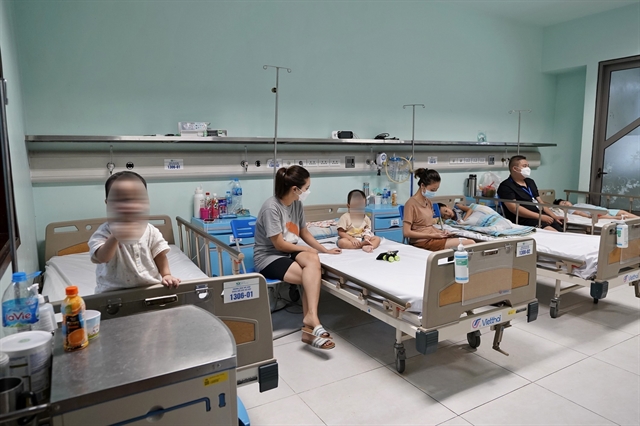 Society
Society

 |
| Doctors treat children with adenovirus at the National Children's Hospital in Hà Nội.— Photo courtesy of the National Children's Hospital |
HÀ NỘI — Most people infected with adenovirus recover on their own without assistance, and most parents should not worry too much about the consequences of their children being infected.
Although there is no specific drug to treat the disease, Trương Hữu Khanh, former head of the Infectious and Nervous Diseases Department at HCM City's Paediatrics Hospital No 1, believes that there is no need to panic.
He said that treating the disease would be similar to treating respiratory infections caused by viruses.
He added that patients would only need to be hospitalised when it is necessary to avoid superinfection.
However, he said that children with underlying diseases, including congenital heart disease, brain disease, chronic lung disease, weak immune system, and bacterial infections, especially drug-resistant bacteria, should be cautious of adenovirus.
Parents should pay special attention to this group of children because they are very susceptible to illness.
Currently, there is no vaccine against adenovirus because the virus has many strains.
The most effective prevention methods consist of washing your hands often with soap and water; disinfecting surrounding areas frequently; letting children drink enough water, eat enough nutrients and get enough sleep to strengthen the child's immune system; giving children all necessary vaccinations; adults who have a cold should wear a mask and keep a distance from children to prevent them from getting sick, he said.
Infections increasing
Data from the National Children's Hospital shows that from the end of August until now, the number of adenovirus infections has increased.
The hospital has recorded more than 1,400 adenovirus infections.
From September 12 to 21, adenovirus accounted for 10 per cent of all patients who came to be examined at the hospital. Adenovirus in children with underlying diseases has caused seven deaths.
On September 22 alone, the hospital detected 150 adenovirus infections. Half needed to be hospitalised.
The hospital has recorded the most significant number of adenovirus infections among examination and treatment facilities in Hà Nội.
In the meantime, Bạch Mai Hospital and other hospitals in the city have recorded nearly 100 cases of Adenovirus infections.
Response
In response to the situation, the city's Department of Health has ordered medical facilities to arrange enough beds, human resources, vehicles and medical supplies to diagnose and treat patients infected with adenovirus.
The medical facilities are told to take measures to prevent infection prevention. The department said that drastic measures must be taken if infections occur in a medical facility.
The department is required to strengthen consultation among local hospitals to treat patients infected with adenovirus.
The department said that severe cases with respiratory failure, sepsis, and multi-organ failure need consultation and will be transferred to central-level hospitals to ensure the safety of patients.
The department said that communication and the dissemination of knowledge for the prevention and control of Adenovirus infection must be enhanced.
The department assigned Đống Đa General Hospital and Saint Paul General Hospital to continue updating knowledge of diagnosis, prevention and treatment of adenovirus for other medical facilities in the city.
Hà Nội's Centre for Disease Control is tasked to cooperate with medical facilities, health centres of districts and towns to strengthen surveillance of the disease caused by the adenovirus, make an assessment and consult solutions to fix the situation with the department. — VNS
Here's what you need to know:
Adenoviruses can cause a wide range of symptoms, including:
• common cold or flu-like symptoms
• fever
• sore throat
• acute bronchitis (inflammation of the airways of the lungs, sometimes called a "chest cold")
• pneumonia (infection of the lungs)
• pink eye (conjunctivitis)
• acute gastroenteritis (inflammation of the stomach or intestines causing diarrhoea, vomiting, nausea and stomach pain)
Adenoviruses are usually spread from an infected person to others through:
• close personal contact, such as touching or shaking hands
• the air by coughing and sneezing
• touching an object or surface with adenoviruses on it, then touching your mouth, nose, or eyes before washing your hands




